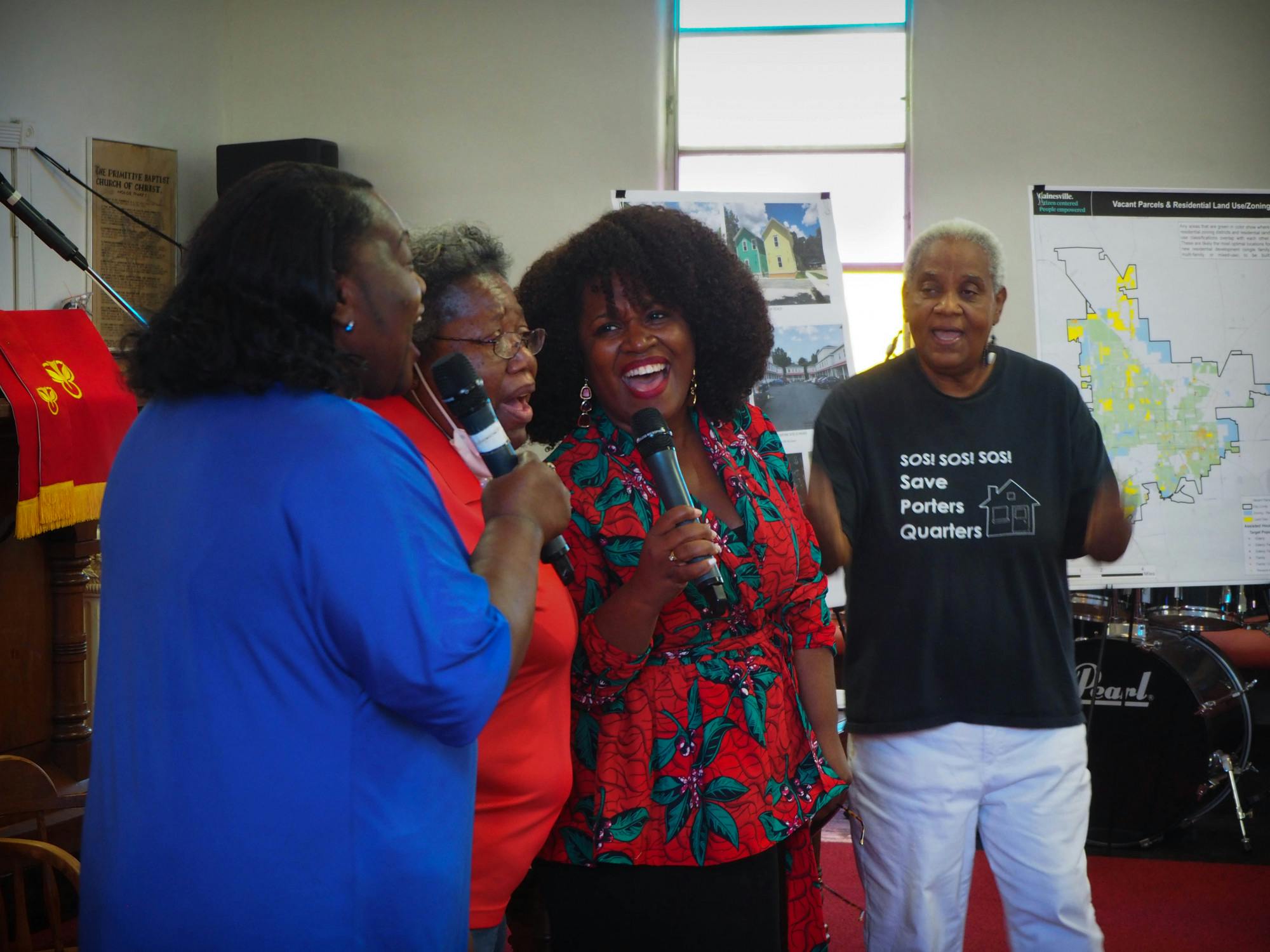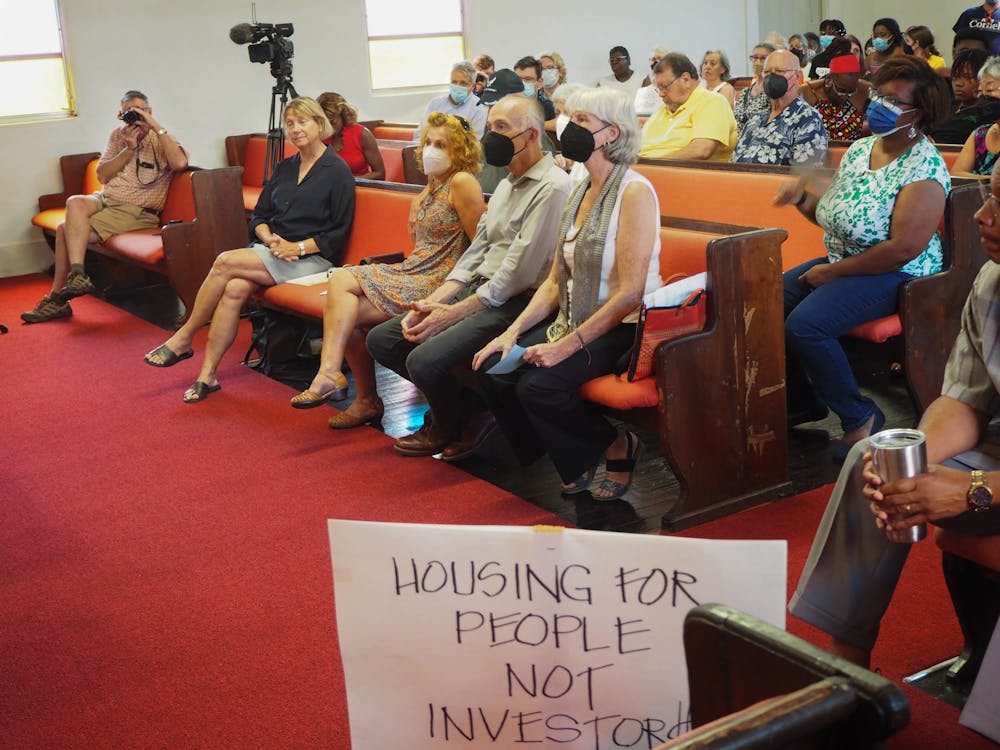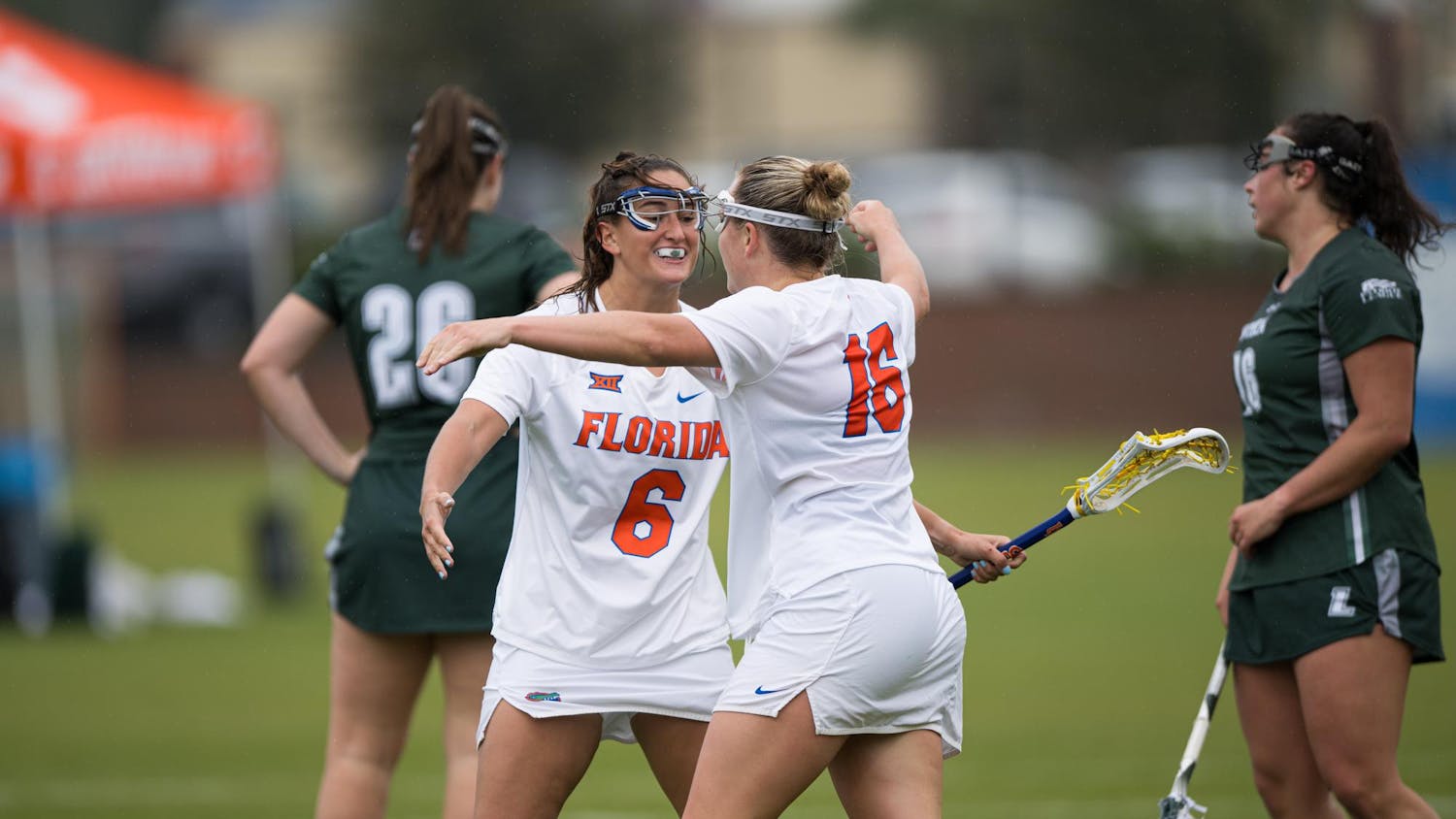Gainesville organizations and residents packed the Shady Grove Primitive Baptist Church Wednesday to voice concerns about the city’s plan to change zoning and occupancy laws.
About 90 attendees filled the 128-year old church, which is located at 804 SW 5th Street in Porters Quarters — one of Gainesville’s historic African-American neighborhoods. With the news of Gainesville potentially becoming the first Florida city to eliminate exclusionary zoning and amend occupancy limits, the demonstrators expressed their apprehension about the city’s proposal.
If the city commission votes for the proposal at the 5 p.m. Thursday meeting, it will allow developers to build two-story multifamily units, like quadruplexes, in residential areas.
Opposing voices fear the city may increase disparities and also continue to lose its charm to developers — the recent closures of Sweetberries Eatery and Frozen Custard July 17 and The Swamp Restaurant in 2020 fresh in residents’ minds.
Monica Frazier, the 46-year-old vice president of Gainesville Neighborhood Voices, helped form the nonprofit July 7 to influence the commission’s proposed zoning change vote.
Six days before the nonprofit’s formation, Gainesville resident and landlord Kurt Johnsen created a petition to stop the commission's proposal. The petition has garnered 2,530 signatures and 110 comments, as of Thursday morning.
Three of the city’s advisory committees — the Housing Advisory Committee, Historic Preservation Board and the City Planning Board — have recommended against the land use policy changes the city proposed, Frazier said.
Ahead of the vote, the commission remains divided. Mayor Lauren Poe and Commissioners Adrian Hayes-Santos, David Arreola and Reina Saco support the elimination while Commissioners Harvey Ward, Cynthia Chestnut and Desmon Duncan-Walker oppose the proposal.

Desmon Duncan-Walker and Faye Williams sing "This Little Light of Mine" to about 80 attendees at Shady Grove Primitive Baptist Church Wednesday, August 3, 2022 to voice concerns about the city’s plan to change zoning and occupancy laws.
Duncan-Walker said community members need more city workshops before the vote, as some community voices still feel unheard by the commission’s proponents of the proposal.
Each community is different, and imposing an ordinance over the entire city is not the solution, she said. Instead, Duncan-Walker said equitable development is what the city needs to look toward.
“No matter what happens,” she said, ”the fight will continue.”
Khai Valcin, a leadership member of the GoDDsville chapter of Dream Defenders and 20-year-old UF women and gender studies senior, said eliminating single-family zoning would allow developers to build student apartment complexes right next to residential buildings.
“A lot of students don’t realize the impact that they’re having being here in Gainesville,” they said. “They’re just here and they leave, and they keep cycling in and out.”
Valcin encouraged students to focus on the upcoming Aug. 23 primary elections and join student and abolitionist organizations to help the community.
Poe and Arreola, who were not present at the community meeting, see the proposal as a way to solve affordable housing issues in Gainesville.
Arreola, who is also a mayoral candidate, said exclusionary zoning reduces housing opportunities for low-income residents.
“It makes it more difficult for folks who are not affluent to find a home because it encourages housing scarcity,” he said.
Eliminating exclusionary zoning will stabilize the housing crisis and rent in the long run, he said, as it will allow for a wide variety of housing: smaller types of housing, more affordable types of housing and housing that is not as costly to build as a single home.
There’s a big misconception this is a “one-size-fits-all solution,” he said, but there are lots of parameters going into effect, like the two-story limit the city will enforce on future developments.
Single-family zoning will still be permissible, and the vote Thursday will just add more inclusive housing types in existing neighborhoods, Poe said.
“This is an important step in helping make our city more inclusive and equitable,” he said. “It will allow more families with more diverse income to live more equally distributed throughout our city.”
Calling Gainesville’s occupancy limit an “artificial barrier” to how people choose to live, Poe said he is in favor of eliminating the occupancy limit.
These changes will make the city less segregated and more inclusive and diverse, he said.
But opposing residents, like the rally presenters, disagree.
“We need to be mindful and very intentional about how we create housing,” Duncan-Walker said. “And that is something this city commission has not done very well.”
Presenters directed residents to show up to City Hall to voice opposition to the vote and urged residents to vote in the upcoming primary election.
Contact Mickenzie Hannon at mhannon@alligator.org. Follow her on Twitter @MickenzieHannon.

Mickenzie is the local elections reporter and previously covered city and county commission for The Alligator’s Metro Desk. She's a fourth-year journalism major and is specializing in data journalism. When Mickenzie isn’t writing, she enjoys watching horror movies, reading, playing with her pets and attending concerts.






